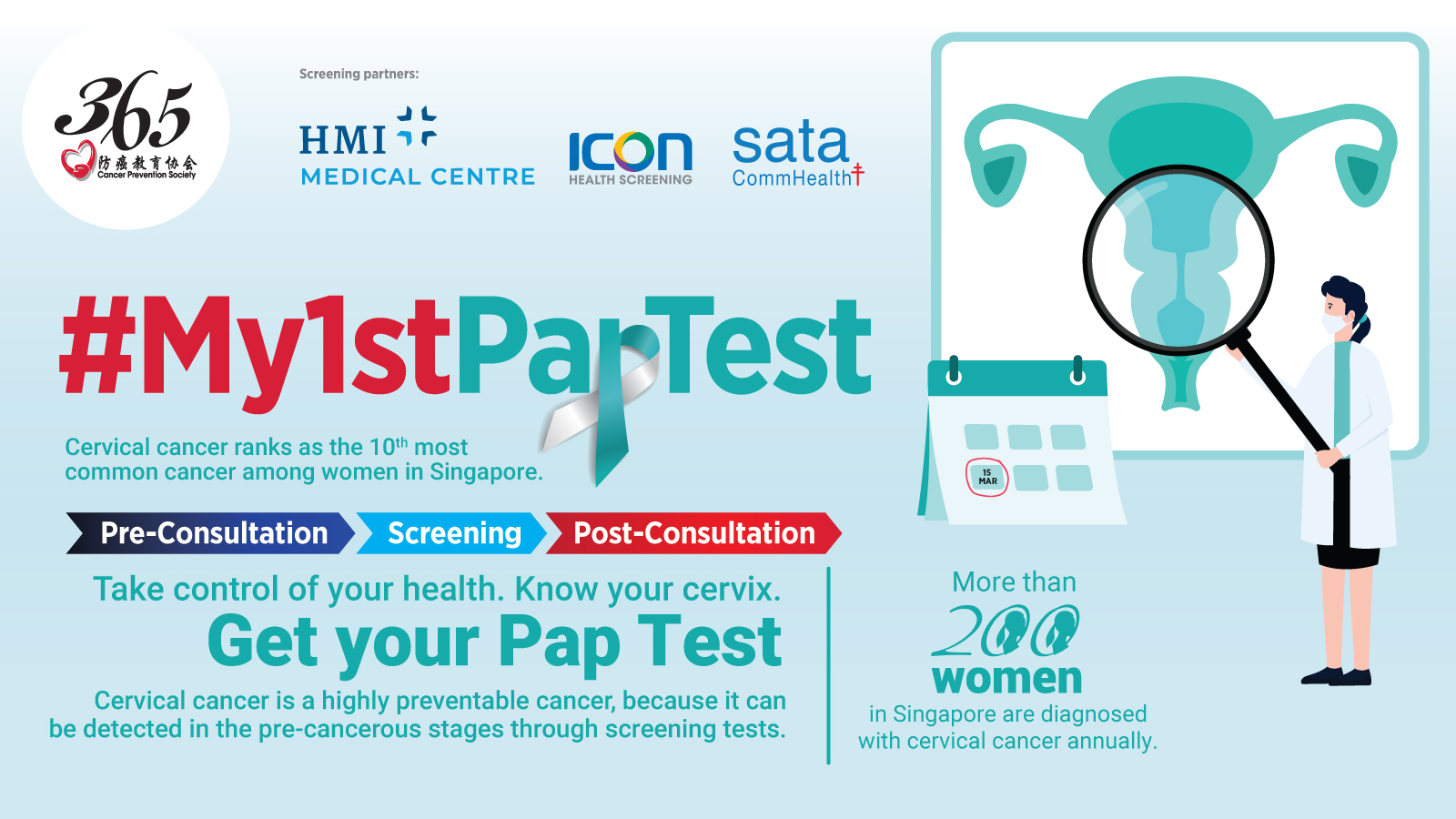Events

The cervix is the neck of the womb (uterus) that connects the body of the womb to the birth canal (vagina).
Cervical cancer is a type of cancer that affects cells of the cervix.
Cervical cancer is the 10th most common female cancer in Singapore. Every year, more than 200 women in Singapore are diagnosed with cervical cancer. Strains of the sexually transmitted infection, human papillomavirus (HPV), play a role in causing most cervical cancer.
#My1stPapTest is a sponsored screening campaign to provide seamless access to Pap Tests for individuals aged 25 to 69 from lower-income families.
Screening Eligibility Criteria:
- 25 years old and above
- Have had any prior sexual intercourse or are sexually active
- Valid blue/orange CHAS card or Public Assistance (PA) card
Signs and Symptoms
Early-stage cervical cancer generally has no signs and symptoms. Signs and symptoms of more advanced cervical cancer include:
- Irregular or abnormal vaginal bleeding – after sexual intercourse, between periods or after menopause
- Watery, bloody vaginal discharge with a foul odour
- Pelvic pain or pain during sexual intercourse
Make an appointment with your doctor if you experience any abnormal vaginal bleeding or if you have any signs or symptoms that worry you.
Any bleeding or spotting after menopause is abnormal. Consult a doctor if you experience this.
Causes and Risk Factors
Infection with Human Papillomavirus (HPV) is the most common cause for cervical cancer. These viruses are transmitted during sexual intercourse, as well as via oral or anal sex.
Other risk factors for cervical cancer include:
- Human Papillomavirus (HPV) infection
- Sexual intercourse at an early age (before age 20)
- Having multiple sexual partners
- Other sexually transmitted infections (STIs), e.g., Chlamydia, Gonorrhoea, Syphilis and HIV/AIDS
- Medical conditions or treatments that affect the immune system, e.g., autoimmune disease, taking long-term steroids or immunosuppressant drugs
- Solid organ transplant
- Past diagnosis of pre-cancerous stage Cervical Intraepithelial Neoplasia (CIN)
- Smoking
How to Prevent Cervical Cancer
Cervical cancer is highly preventable and curable when detected through regular screening and treated early. There are abnormal cellular changes in the cervix before cervical cancer develops. These abnormal changes are known as cervical pre-cancer or Cervical Intraepithelial Neoplasia (CIN). Successful treatment of CIN removes a woman’s risk of developing cervical cancer.
- Cervical cancer screening – This is often known as a Pap smear, where cells are collected from the cervix and analysed for the presence of cancer cells. Another form of cervical screening is a HPV test which looks for the virus responsible for most cases of cervical cancer.
- HPV vaccination – This helps to protect against cancer-causing HPV strains. It is most effective when given before a person becomes sexually active. The vaccine can be given to both boys and girls.
- Limit exposure to HPV – Limit the number of sexual partners, and use a condom or other form of barrier protection during sexual intercourse.
- Quit smoking – You can reduce your risk for cervical cancer and other serious diseases by quitting smoking.
Preparation for a Pap Test
Appointment
If you are menstruating, schedule your appointment 2 weeks after your period begins, ideally ending about a week before your next period is expected. This timing ensures the clearest sample of cervical cells.
If you have reached menopause you can schedule your Pap Test at any time during the month.
Things To Avoid
To ensure the most accurate results, please avoid the following for 48 hours before your appointment:
- Douching
- Swimming
- Taking a bath
- Sexual intercourse
- Using lubricants, spermicides, vaginal creams, or medications
- Inserting tampons
These products and activities can irritate the cervix and interfere with cell sample collection. Infection and medication such as digitalis and tetracycline may also affect Pap Test results.
What To Wear For Your Appointment
Please wear a two-piece outfit for your Pap Test appointment. Light bleeding or spotting may occur after a Pap Test and would be useful to bring along a panty liner or thin sanitary pad with you.
Screening Process
| 1. | Register with 365CPS |
Click on the “Register” button, complete and submit the online registration form. Upon submission, our staff will respond to you in 5 working days. Eligible individuals will receive a Confirmation Letter endorsed by 365CPS. |
| 2. | Schedule an appointment |
Once you receive the Confirmation Letter endorsed by 365CPS, kindly contact the selected clinic directly to schedule an appointment. Kindly bring along your NRIC and Confirmation Letter for your appointment. |
| 3. | Pap Test | The appointment will involve a Pap Test to detect cervical cancer. |
| 4. | Review | Should your results indicate any abnormalities, a referral letter will be issued to refer you to a public health setting for further investigations. |


